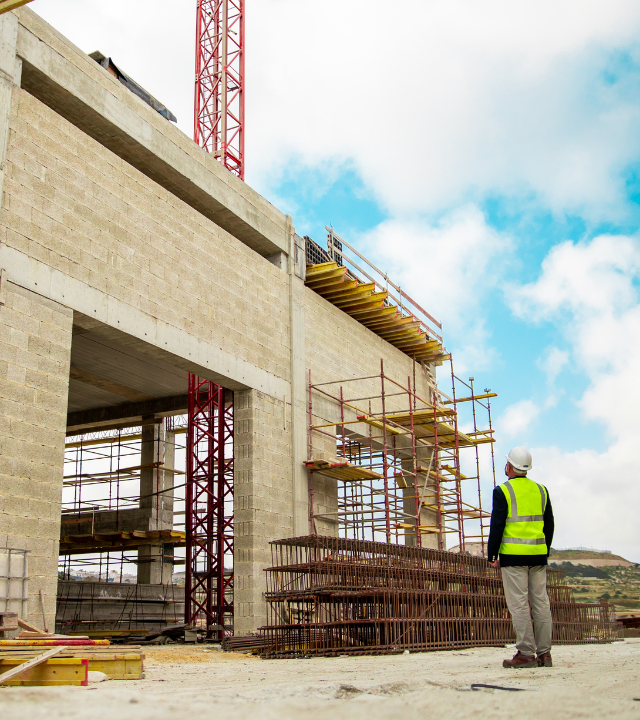CIOB
CIOB - The Chartered Institute of Building
The world’s largest and most influential professional body for construction management and leadership. CIOB has a Royal Charter to promote the science and practice of building and construction for the benefit of society and has been doing that since 1834. CIOB members work worldwide in the development, conservation, and improvement of the built environment. They represent the entire lifecycle of a built asset and in the infrastructure, we utilise in our everyday lives.
The Academy
CIOB’s Academy is the home for professional development resources that support the mission of the CIOB and the wider construction profession to deliver excellence. The Academy believes in helping individuals realise their potential in the construction industry by nurturing the right practical skills and attitudes needed for an industry that’s becoming increasingly sophisticated, efficient and technologically advanced.
Cares deeply about making absolutely clear the next steps that people need to take in order to take their careers forward.
Has the ambition to connect learners with funding, mentors and employment to ensure they find the outcomes they seek from learning.
Encourages collaboration with organisations in order to create efficiencies in practice-based training and development.
Committed to providing effective solutions to help people succeed in the construction industry
Will show the world that construction managers who have come through the Academy are a talented and diverse workforce who make a real and positive difference to global challenges in the built environment.


Chartered Membership Programme
Specifically, the course will develop your skills in planning and scheduling construction projects, as well as your ability to deal with the legal framework around health and safety, understand the factors which affect the costs of a construction project, and how work is procured. You will also develop the required understanding of concepts in ground engineering techniques and substructure technology.
Following the 4 modules, you will also be given guidance on the professional review, the final stage to chartered membership. All together you will gain both the required technical skills and a complete understanding of the membership process so that you can approach your application with confidence
Objectives
At the end of the course, you will be able to:
• Understand the law in relation to the construction industry
• Effectively administer construction contracts and disputes
• Manage the procurement process and commercial risks
• Apply the relevant legislation and standards to ensure health and safety on site
• Demonstrate knowledge of sustainable construction and its application
• Analyse the design structures and detail the different design solutions
• Manage time, resources and people on all types of project
Structure
The Programme is made up of 4 modules designed to give you the specialist knowledge and skills required to manage construction projects effectively along side professional review advice and preparation. The modules are below and a complete course guide can be found here.
In addition, all teachers are MCIOB/FCIOB and have extensive, relevant technical experience and competence.
Contracts and Commercial Practice
• Understand the law in relation to the construction industry
• Understand the factors that affect the costs of a construction project
• Understand the pre-and-post contract administrative processes
• Understand how construction work is procured, how commercial risk is managed and how construction disputes can be resolved
Construction Technology
• Develop the required understanding of concepts in ground engineering techniques and substructure technology
• Understand the principles of the installation of building services
• Analyse the design and operation of the superstructure for commercial and multi storey buildings
• Understand the principles of relating to work on existing structures and fabric
• Understand the design process in relation to the built environment
Health, Safety and the Environment
• Understand the legal framework underpinning health and safety
• Understand actual or anticipated health, safety and environmental risks
• Understand the aims of sustainable development, legislation and its application to the Built Environment
• Understand problems from an environmental perspective and how they apply to organisational strategy and policy formation
Management
• Understand process management in the construction industry
• Understand the management of resources used in the construction industry
• Understand the planning and scheduling of construction projects
• Understand performance management within the construction industry
Site Management Certificate
The demand for skilled workers in construction has never been higher, with some industry reports estimating that the construction industry will need to recruit over 200,000 skilled workers in the coming years. As such, possessing a recognised qualification is a great way to meet this growing industry demand.
Our new, online Site Management Certificate gives you all the tools and knowledge to gain a recognised professional qualification as well as the skills to manage people, activities and processes on construction sites.


Developed by a hugely experienced construction professional, the certificate course contains 3 units that will focus on the principles required to manage the quality of construction, as well as your ability to manage contractual and legal responsibilities. You will also learn best practices in health, safety and the environment.
In summary, the Site Management certificate course will put you on the path to management of all site-based staff employed by the company to ensure that the project is delivered within their contractual obligations.
Objectives
The Site Management Certificate develops the knowledge and practical skills to enable candidates to deliver construction projects safely and efficiently.
At the end of your course you will be able to:
• Manage quality control on a construction site
• Manage legislative requirements for health, safety and welfare practice within a construction site
• Manage contractual and legal responsibilities to ensure compliance
Structure
This course is designed to meet the needs of those employed in, or training for, site management. You complete 3 units for the Certificate. Units include managing the quality of site work and managing health, safety and risk control at work.
The content is taught in 4 week blocks. The course is online and tutor instructional learning has been created by a subject and industry expert. Delegates are provided with site drawings for each assignment and practical examples of working on a construction site.
Each unit will deliver the content using the following resources in order to give a rich and informative experience:
• Instructional eLearning
• Course reading materials
• Case studies and practical exercises.
• Online forum for tutor and delegates
• Live webinars in the middle and at the end of each module.
Contents
The course is made up of the following technical units. This particular combination of units has been chosen for the breadth of skills and knowledge needed to work effectively on site:
Unit – Managing the Quality of Construction Works
• Quality systems, procedures and standards for construction works
• Management of systems to monitor and control the quality of work
• Use of recycled and recovered materials and quality control
Unit – Managing Health, Safety, Welfare and Risk in Construction Works
• The application of current Construction Design and Management (CDM) regulations, or equivalent
• Health, Safety and Welfare legislation and influences on working practices in the construction industry
• Health, Safety and Welfare management on construction projects
Unit – Contract and Legal Responsibilities within a Construction Environment
• Evaluate the impact of legislation and standards on construction works.
• Apply principles of compliance of the works under a construction contract
• Explain the key processes which deal with claims and variations. Transferable Skills
• Use and explain specified information and present ideas for different audiences.
• Solve defined problems and evaluate the solutions.
CPD
What is CPD?
Staying professionally competent can take many forms; talking to colleagues, reading up on construction topics, attending training, seminars or conferences or mentoring others – activity generally known as Continuing Professional Development (CPD).
What is CPD and why should you do it?
CIOB members are professionals and those who use our services do so because they can be sure that our knowledge is up-to-date and complete. Staying professionally competent can take many forms; talking to colleagues, reading up on construction topics, attending training, seminars or conferences or mentoring others – activity generally known as Continuing Professional Development (CPD).
CIOB is developing CPD tools to help you keep your knowledge, understanding and expertise up to scratch. Part of the CIOB offering is this CPD portal which contains a core of material from Construction Manager magazine and which will build over time to include the best webinars and videos from Local Hub CPD sessions and a variety of materials developed by CIOB members for your benefit.
When you have completed a piece of CPD, we will ask you for feedback including: Is this information up-to-date and accurate, would you recommend it to others and, how will you use this material in your working life?
Staying professionally competent can take many forms; talking to colleagues, reading up on construction topics, attending training, seminars or conferences or mentoring others – activity generally known as Continuing Professional Development (CPD).
